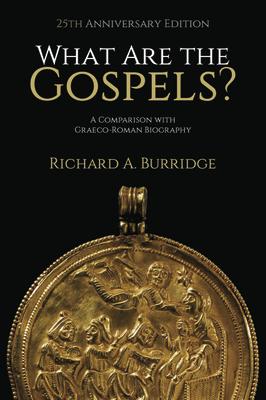The publication of Richard Burridge's What Are the Gospels? in 1992 inaugurated a transformation in Gospel studies by overturning the previous consensus about Gospel uniqueness. Burridge argued convincingly for an understanding of the Gospels as biographies, a ubiquitous genre in the Graeco-Roman world.
To establish this claim, Burridge compared each of the four canonical Gospels to the many extant Graeco-Roman biographies. Drawing on insights from literary theory, he demonstrated that the previously widespread view of the Gospels as unique compositions was false. Burridge went on to discuss what a properly "biographical" perspective might mean for Gospel interpretation, which was amply demonstrated in the revised second edition reflecting on how his view had become the new consensus. This third, twenty-fifth anniversary edition not only celebrates the continuing influence of What Are the Gospels?, but also features a major new contribution in which Burridge analyzes recent debates and scholarship about the Gospels. Burridge both answers his critics and reflects upon the new directions now being taken by those who accept the biographical approach. This new edition also features as an appendix a significant article in which he tackles the related problem of the genre of Acts. A proven book with lasting staying power, What Are the Gospels? is not only still as relevant and instructive as it was when first published, but will also doubtlessly inspire new research and scholarship in the years ahead.
Book
What Are the Gospels?: A Comparison with Graeco-Roman Biography
(Write a Review)
Paperback
$55.54
The publication of Richard Burridge's What Are the Gospels? in 1992 inaugurated a transformation in Gospel studies by overturning the previous consensus about Gospel uniqueness. Burridge argued convincingly for an understanding of the Gospels as biographies, a ubiquitous genre in the Graeco-Roman world.
To establish this claim, Burridge compared each of the four canonical Gospels to the many extant Graeco-Roman biographies. Drawing on insights from literary theory, he demonstrated that the previously widespread view of the Gospels as unique compositions was false. Burridge went on to discuss what a properly "biographical" perspective might mean for Gospel interpretation, which was amply demonstrated in the revised second edition reflecting on how his view had become the new consensus. This third, twenty-fifth anniversary edition not only celebrates the continuing influence of What Are the Gospels?, but also features a major new contribution in which Burridge analyzes recent debates and scholarship about the Gospels. Burridge both answers his critics and reflects upon the new directions now being taken by those who accept the biographical approach. This new edition also features as an appendix a significant article in which he tackles the related problem of the genre of Acts. A proven book with lasting staying power, What Are the Gospels? is not only still as relevant and instructive as it was when first published, but will also doubtlessly inspire new research and scholarship in the years ahead.Paperback
$55.54